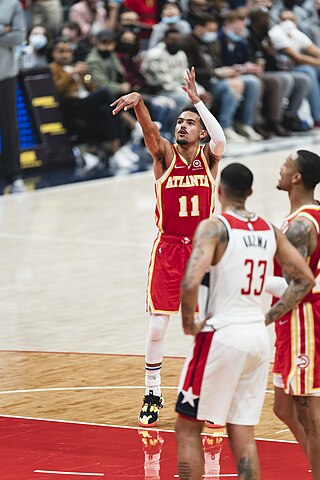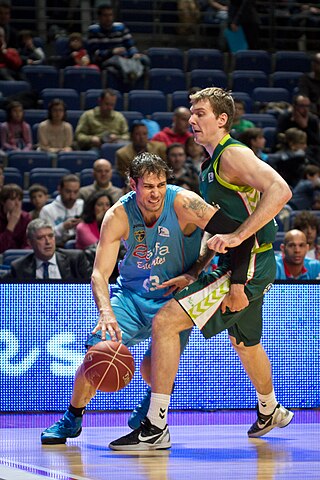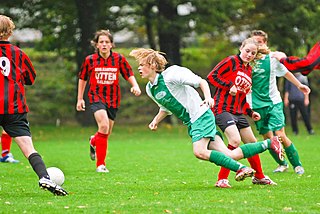
Basketball is a team sport in which two teams, most commonly of five players each, opposing one another on a rectangular court, compete with the primary objective of shooting a basketball through the defender's hoop, while preventing the opposing team from shooting through their own hoop. A field goal is worth two points, unless made from behind the three-point line, when it is worth three. After a foul, timed play stops and the player fouled or designated to shoot a technical foul is given one, two or three one-point free throws. The team with the most points at the end of the game wins, but if regulation play expires with the score tied, an additional period of play (overtime) is mandated.
In basketball, a technical foul is any infraction of the rules penalized as a foul which does not involve physical contact during the course of play between opposing players on the court, or is a foul by a non-player. The most common technical foul is for unsportsmanlike conduct. Technical fouls can be assessed against players, bench personnel, the entire team, or even the crowd. These fouls, and their penalties, are more serious than a personal foul, but not necessarily as serious as a flagrant foul.

A shot clock is a countdown timer used in a variety of games and sports, proving a set amount of time that a team may possess the object of play before attempting to score a goal. Shot clocks are used in several sports including basketball, water polo, lacrosse, poker, ringette, korfball, tennis, ten-pin bowling, and various cue sports. It is analogous with the play clock used in American and Canadian football, and the pitch clock used in baseball. This article deals chiefly with the shot clock used in basketball.

In basketball, free throws or foul shots are unopposed attempts to score points by shooting from behind the free-throw line, a line situated at the end of the restricted area. Free throws are generally awarded after a foul on the shooter by the opposing team, analogous to penalty shots in other team sports. Free throws are also awarded in other situations, including technical fouls, and when the fouling team has entered the bonus/penalty situation. Also, depending on the situation, a player may be awarded between one and three free throws. Each successful free throw is worth one point.

In basketball, a personal foul is a breach of the rules that concerns illegal personal contact with an opponent. It is the most common type of foul in basketball. A player fouls out on reaching a limit on personal fouls for the game and is disqualified from participation in the remainder of the game.

The rules of basketball are the rules and regulations that govern the play, officiating, equipment and procedures of basketball. While many of the basic rules are uniform throughout the world, variations do exist. Most leagues or governing bodies in North America, the most important of which are the National Basketball Association and NCAA, formulate their own rules. In addition, the Technical Commission of the International Basketball Federation (FIBA) determines rules for international play; most leagues outside North America use the complete FIBA ruleset.

In sports, an ejection is the removal of a participant from a contest due to a violation of the sport's rules. The exact violations that lead to an ejection vary depending upon the sport, but common causes for ejection include unsportsmanlike conduct, violent acts against another participant that are beyond the sport's generally accepted standards for such acts, abuse against officials, violations of the sport's rules that the contest official deems to be egregious, or the use of an illegal substance to better a player's game. Most sports have provisions that allow players to be ejected, and many allow for the ejection of coaches, managers, or other non-playing personnel. In sports that use penalty cards, a red card is often used to signal dismissals.
In sports, running out the clock is the practice of a winning team allowing the clock to expire through a series of preselected plays, either to preserve a lead or hasten the end of a one-sided contest. Such measures expend time but do not otherwise have a tactical purpose. This is usually done by a team that is winning by a slim margin near the end of a game, in order to reduce the time available for the opposing team to score. Generally, it is the opposite strategy of running up the score.

In basketball, a flagrant foul is a personal foul that involves excessive or violent contact that could injure the fouled player. A flagrant foul may be unintentional or purposeful; the latter type is also called an "intentional foul" in the National Basketball Association (NBA). However, not all intentional fouls are flagrant fouls, as it is an accepted strategy to intentionally commit a foul in order to regain possession of the ball while minimizing how much time elapses on the game clock.

This glossary of basketball terms is a list of definitions of terms used in the game of basketball. Like any other major sport, basketball features its own extensive vocabulary of unique words and phrases used by players, coaches, sports journalists, commentators, and fans.

In basketball, a foul is an infraction of the rules more serious than a violation. Most fouls occur as a result of illegal personal contact with an opponent and/or unsportsmanlike behavior. Fouls can result in one or more of the following penalties:
A defensive three-second violation, also known as illegal defense, is a basketball rules infraction in the National Basketball Association (NBA). It is assessed when a member of the defending team spends more than three seconds in the free throw lane while not actively guarding an opponent. To be considered actively guarding an opponent, a defender must be within arm's length of an opponent and must be in a guarding position. A violation will not be called if an offensive player is in the act of shooting, if the offensive team loses control of the ball, if it is imminent that the defender's position will become legal, or if the defender is guarding a player who has possession of the ball.
In Canadian football, the three-minute warning is given when three minutes of game time remain on the game clock in the first and second halves of a game. The three-minute warning stops the game clock in all cases. It is the Canadian football equivalent of the two-minute warning in the American game.
In basketball, the five-second rule, or five-second violation, is a rule that helps promote continuous play. There are multiple situations where a five-second violation may occur.
Delay of game is an action in a sports game in which a player or team deliberately stalls the game, usually with the intention of using the delay to its advantage. In some sports, the delay of game is considered an infraction if it is longer than that permitted according to the game's rules, in which case a penalty can be issued. Some sports that have a delay of game penalty are American football, Canadian football, ice hockey and association football.

The key, officially referred to as the free throw lane by the National Basketball Association (NBA), the National Collegiate Athletic Association (NCAA), the National Association of Intercollegiate Athletics (NAIA), and the National Federation of State High School Associations (NFHS), and the restricted area by the International Basketball Federation (FIBA) is a marked area on a basketball court surrounding the basket, where much of the game's action takes place.

In sports, a foul is an inappropriate or unfair act by a player as deemed by a referee, usually violating the rules of the sport or game. A foul may be intentional or accidental, and often results in a penalty. Even though it may not be intentional, fouling can still cause serious harm or injury to opposing players, or even their own players if unaware of their surroundings during particular situations on sports. Fouls are used in many different sports. Often own teammates can clash and foul each other by accident, such as both going for and with eyes on a ball in AFL. Strategical fouls violate the traditional norms of cooperation and agreement to the essential rules and regulations of the game, or are perhaps not part of the games at all.

In gridiron football, a penalty is a sanction assessed against a team for a violation of the rules, called a foul. Officials initially signal penalties by tossing a bright yellow colored penalty flag onto the field toward or at the spot of a foul.

In the sport of basketball, the bonus situation occurs when one team accumulates a requisite number of fouls, the number of which varies depending on the level of play. When one team has committed the requisite number of fouls, each subsequent foul results in the opposing team's taking free throws regardless of the type of foul committed. Teams under the limit are commonly referred to as having fouls to give, and thus they can try to disrupt their opponents without being penalized free throws. These fouls reset every quarter or half depending on the rules in use.
Basketball is a ball game and team sport in which two teams of five players try to score points by throwing or "shooting" a ball through the top of a basketball hoop while following a set of rules. Since being developed by James Naismith as a non-contact game that almost anyone can play, basketball has undergone many different rule variations, eventually evolving into the NBA-style game known today. Basketball is one of the most popular and widely viewed sports in the world.












